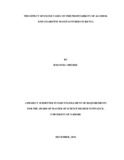| dc.contributor.author | Chesire, Emanuel | |
| dc.date.accessioned | 2019-01-15T12:53:48Z | |
| dc.date.available | 2019-01-15T12:53:48Z | |
| dc.date.issued | 2018 | |
| dc.identifier.uri | http://hdl.handle.net/11295/104776 | |
| dc.description.abstract | It is the responsibility of the government to look at the welfare of its citizens. The government tries to discourage use of products that might be considered social vices, by trying to influence their prices through increase in excise taxes. The alcohol and the cigarettes manufacturing firms in Kenya have been targeted by the government through constant increase on excise tax in order to discourage use of products that might have adverse effect on the well-being of the citizens. This study therefore undertook to look at the effect of excise tax on profitability of alcohol and Cigarettes manufacturers in Kenya listed at the NSE. There are only two companies that fall in this category, namely EABL and BAT company Limited. The excise taxes introduced by the government tends to increase the price of these products making them expensive and therefore undesirable by the general population. The study undertaken used secondary data that was obtained from the companies’ websites and the NSE handbooks. A descriptive research design was adopted as it tried to determine the relationships between variables. Data collected was analyzed by the use of multiple regression where excise tax was the independent variable, liquidity ratio and market share price were the control variables. The dependent variable was profitability that was determined by the use of net profit margin. A correlation analysis was undertaken that showed a negative correlation between excise tax and profitability that meant that increase in these taxes led to a decrease in profitability. The study found a positive correlation between liquidity ratio and profitability at 0.466 and almost zero correlation between market share price and profitability. The study rejected the null hypothesis of the model as the F value calculated was greater than the F critical value and similarly the significance of the model was statistically significant as the alpha was more than the p value. | en_US |
| dc.language.iso | en | en_US |
| dc.publisher | University of Nairobi | en_US |
| dc.rights | Attribution-NonCommercial-NoDerivs 3.0 United States | * |
| dc.rights.uri | http://creativecommons.org/licenses/by-nc-nd/3.0/us/ | * |
| dc.subject | The Effect of Excise Taxes on the Profitability of Alcohol and Cigarette Manufacturers in Kenya | en_US |
| dc.title | The Effect of Excise Taxes on the Profitability of Alcohol and Cigarette Manufacturers in Kenya | en_US |
| dc.type | Thesis | en_US |



